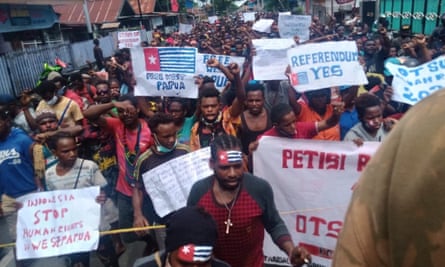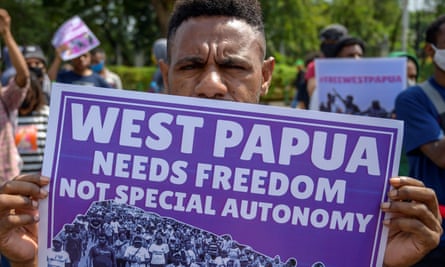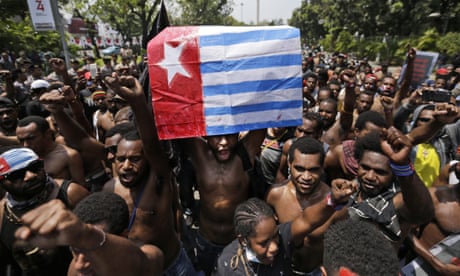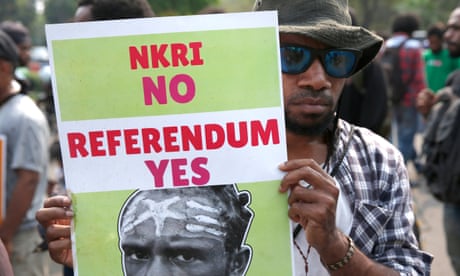Protests flare in Papua as students demand independence referendum (colonie indonésienne-océan Pacifique)
Police fire shots as crowds of demonstrators demand a vote on secession from Indonesia

Unrest has flared in the restive Indonesian region of Papua with police firing shots during a protest by hundreds of university students in the provincial capital, Jayapura.
The group was demonstrating against plans to extend a special autonomy law that protestors say has not done enough to help people in one of the country’s poorest regions.
The 2001 Special Autonomy Law, which is set to expire in 2021, was supposed to give Papua and West Papua provinces a larger share of revenue from their rich natural resources and greater political autonomy.
Indonesian-controlled Papua and West Papua form the western half of the island of New Guinea. Political control of the region has been contested for more than half a century and Indonesia has consistently been accused of human rights violations and violent suppression of the region’s independence movement.
Pro-independence protestors say the special autonomy law is being used to repress Papua’s independence movement, and are demanding a referendum on secession from Indonesia.
“Despite the funds, health care isn’t guaranteed and education remains minimal,” student Ayus Heluka said by telephone after attending Monday’s rally at Cendrawasih University in the Papuan capital of Jayapura.
Papuan police spokesman Ahmad Kamal confirmed by telephone that police had fired warning shots but denied claims protestors at the rally that two students had been hurt and three arrested.
Video and photo footage on social media showed people running in panic after shots were heard.
There has been a flare-up in tensions in Papua between security forces and separatists groups in recent weeks, with the deaths of at least two civilians and two soldiers, including the shooting of a popular Christian pastor.
The United Liberation Movement of West Papua said up to 200 protestors have been arrested across Nabire regency, sparking further demonstrations for the release of those political prisoners.
Earlier this month, Pastor Yeremia Zanambani was found dead near his home, his body riddled with bullet and stab wounds. No-one has been charged for his murder, and Papuan independence groups fear there will be no genuine investigation into his death.
The former Dutch colony was incorporated into Indonesia after a UN-backed 1969 referendum called the Act of Free Choice, widely condemned as having been fraudulent, with just over 1,000 selected Papuans forced, some threatened with violence, to vote in support of Indonesian rule.
Special autonomy is resisted by much of the Papuan population who are demanding a free referendum on independence.
The exiled West Papuan leader, Benny Wenda, chair of the United Liberation Movement of West Papua, said Indonesia had been promising the people of West Papua autonomy for 50 years.
“Each time, underneath autonomy lies only bullets and killings,” he wrote in July.
“As the 2001 special autonomy law expires this year … the people of West Papua are united in rejecting Indonesian-controlled ‘autonomy’. There is only one solution to our problem: an independence referendum.”

Indonesia regards Papua and West Papua as integral and indivisible parts of the Indonesian state, and has consistently said it is working to develop the region.
Papua and West Papua, while rich in natural resources – Papua’s Grasberg is the world’s largest gold mine – are among the least developed provinces in Indonesia, with endemic poverty and high levels of childhood malnutrition.
The people indigenous to Papua and West Papua are Melanesian, ethnically distinct from the rest of Indonesia and more closely linked to the people of Papua New Guinea, Solomon Islands, Vanuatu, Fiji and New Caledonia.
At the UN general assembly this week, Vanuatu’s prime minister, Bob Loughman, said “the indigenous people of West Papua continue to suffer from human rights abuses”, arguing there had been “little progress” in addressing violations.
Indonesian diplomat Silvany Austin Pasaribu responded, telling Vanuatu’s leader “please keep the sermon to yourself”.
“It is shameful that this single country continues to have excessive and unhealthy obsession about how Indonesia should govern itself. You are no representation of the people of Papua, and stop fantasising of being one.”
News is under threat …
… just when we need it the most. Millions of readers around the world are flocking to the Guardian in search of honest, authoritative, fact-based reporting that can help them understand the biggest challenge we have faced in our lifetime. But at this crucial moment, news organisations are facing a cruel financial double blow: with fewer people able to leave their homes, and fewer news vendors in operation, we’re seeing a reduction in newspaper sales across the UK. Advertising revenue continues to fall steeply meanwhile as businesses feel the pinch. We need you to help fill the gap.
We believe every one of us deserves equal access to vital public service journalism. So, unlike many others, we made a different choice: to keep Guardian journalism open for all, regardless of where they live or what they can afford to pay. This would not be possible without financial contributions from those who can afford to pay, who now support our work from 180 countries around the world.
Reader financial support has meant we can keep investigating, disentangling and interrogating. It has protected our independence, which has never been so critical. We are so grateful.
We need your support so we can keep delivering quality journalism that’s open and independent. And that is here for the long term. Every reader contribution, however big or small, is so valuable. Support The Guardian from as little as £1 – and it only takes a minute. Thank you.


Aucun commentaire:
Enregistrer un commentaire